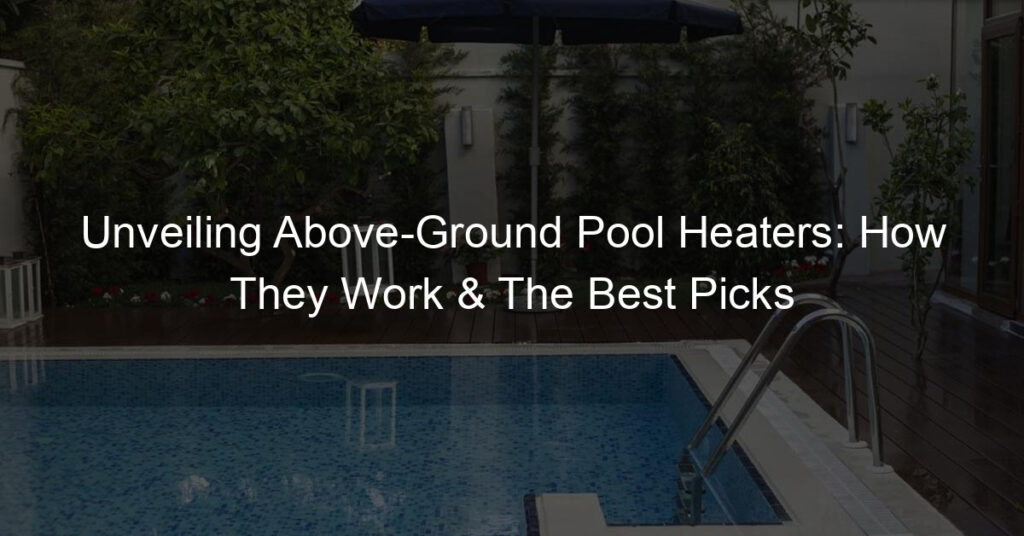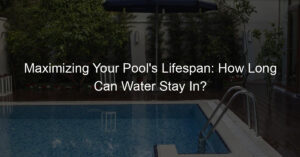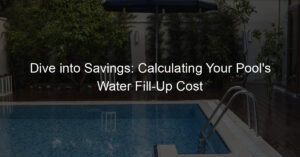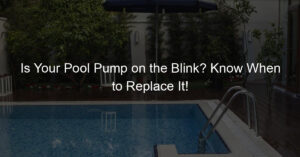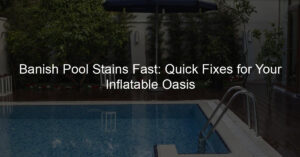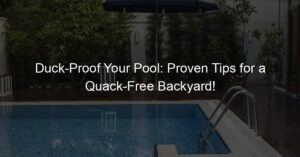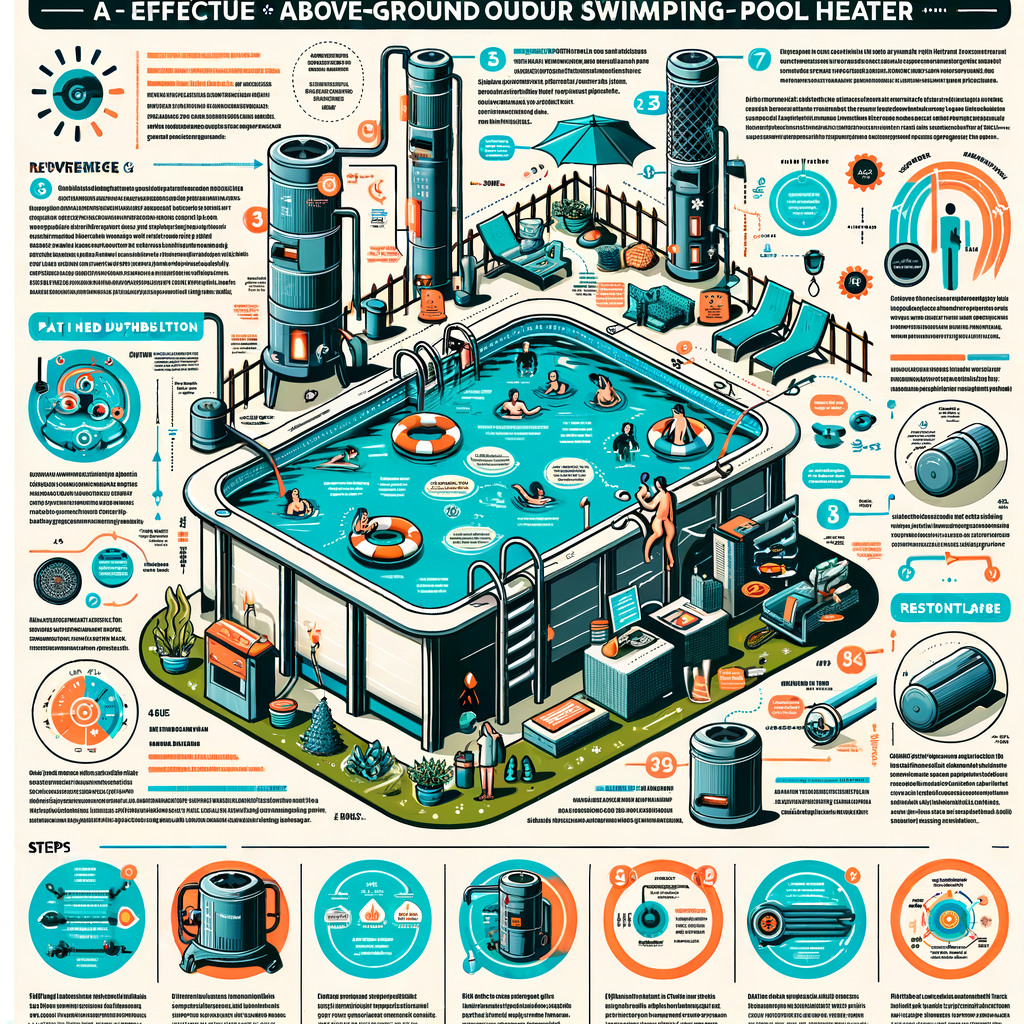
Introduction to Above-Ground Pool Heaters
As the weather begins to cool, many pool owners start to think about how they can extend their swimming season. One of the most effective ways to do this is by using an above-ground pool heater. But what exactly is an above-ground pool heater, and why is it so important? Let’s dive in and find out.
- Overview of above-ground pool heaters
- The importance of pool heaters
Above-ground pool heaters are devices designed to heat the water in your swimming pool. They work by using either gas, electricity, or solar power to increase the temperature of the water, making it more comfortable to swim in, even during cooler months. These heaters are specifically designed for above-ground pools, which are pools that are not built into the ground but rather sit on top of it.
Pool heaters are essential for several reasons. Firstly, they extend your swimming season. Without a heater, you may only be able to use your pool during the hot summer months. With a heater, you can enjoy your pool in the spring and fall, and in some cases, even in the winter.
Secondly, pool heaters improve comfort. Even during the summer, pool water can sometimes be chilly, especially in the morning or late in the evening. A pool heater ensures that your pool is always at a comfortable temperature, no matter what time of day you want to swim.
Lastly, pool heaters can increase the value of your pool and your property. A pool that can be used year-round is a major selling point for potential home buyers.
In conclusion, above-ground pool heaters are a valuable addition to any pool. They extend the swimming season, improve comfort, and can even increase the value of your property. So, if you’re a pool owner looking to get the most out of your investment, consider installing an above-ground pool heater.
Understanding Pool Heater Functioning
Have you ever wondered how your pool heater works? It’s not as complicated as it might seem. In this section, we’ll explain the basic principles of pool heater operation and discuss the different types of pool heaters available. Let’s dive in!
- Basic principles of pool heater operation
- Types of pool heaters
At its core, a pool heater works by using a source of energy to heat up water before it’s pumped back into your pool. This process is similar to how your home’s heating system works. The heater takes in cold water from the pool, heats it up, and then sends it back into the pool, raising the overall temperature.
There are three main types of pool heaters: gas, electric, and solar. Each type has its own set of pros and cons, which we’ll discuss in more detail later. Gas heaters use propane or natural gas to heat the water, electric heaters use electricity, and solar heaters use energy from the sun. The best type for you depends on your specific needs and circumstances.
Understanding how your pool heater works can help you make informed decisions about pool maintenance and energy use. In the following sections, we’ll delve deeper into each type of pool heater, explaining how they work and their respective pros and cons. Stay tuned!
Gas Pool Heaters
Gas pool heaters are a popular choice for many pool owners. They use natural gas or propane to heat the water in your pool. But how do they work? And what are the pros and cons of using them? Let’s dive in and find out.
- How Gas Pool Heaters Work
Gas pool heaters work by burning natural gas or propane in a combustion chamber. The heat generated is then transferred to the pool water, which circulates through the heater. Here’s a simple breakdown:
- The pool pump circulates the water and directs it to the heater.
- The gas burns in the heater’s combustion chamber, generating heat.
- The heat is transferred from the combustion chamber to the water.
- The heated water is then returned to the pool.
This process continues until the pool reaches the desired temperature.
- Pros and Cons of Gas Pool Heaters
| Pros | Cons |
|---|---|
| Fast heating time | Higher operational costs |
| Works in any climate | Requires a gas line or propane tank |
| Can heat large pools | Not as energy efficient as other types |
Gas pool heaters can heat your pool quickly, making them a great choice if you use your pool sporadically or want to heat it fast for an event. They can also work in any climate and are capable of heating large pools.
However, they have higher operational costs due to the price of natural gas or propane. They also require a gas line or a propane tank, which can be a hurdle for some homeowners. Lastly, they are not as energy efficient as other types of pool heaters, such as solar or electric heaters.
Electric Pool Heaters
Electric pool heaters are a popular choice for many pool owners. Let’s dive into how they work and their pros and cons.
- How Electric Pool Heaters Work
- Pros and Cons of Electric Pool Heaters
Electric pool heaters, also known as heat pumps, work by extracting heat from the air around the pool. They use electricity to power a fan that draws in air. This air passes over an evaporator coil, which contains a special refrigerant. This refrigerant turns from a liquid into a gas as it absorbs heat from the air. The heated gas then passes through a compressor, which increases its temperature even more. Finally, this super-heated gas travels through a heat exchanger, transferring its heat to the pool water.
| Pros | Cons |
|---|---|
| Energy-efficient | High upfront cost |
| Long lifespan | Requires professional installation |
| Works in all climates | May take longer to heat the pool |
Electric pool heaters are energy-efficient, meaning they use less electricity than other types of heaters. This can save you money on your energy bills in the long run. They also have a long lifespan, often lasting 10-20 years with proper maintenance.
On the downside, electric pool heaters have a high upfront cost. They also require professional installation, which can add to the initial expense. While they work in all climates, they may take longer to heat the pool than gas heaters, especially in colder weather.
Solar Pool Heaters
Let’s delve into the world of solar pool heaters. These devices harness the power of the sun to keep your pool warm and inviting. Here’s how they work and some of their key advantages and disadvantages.
- How Solar Pool Heaters Work
Solar pool heaters operate on a simple yet effective principle. They use solar collectors, often installed on a roof or other sunny spot, to absorb the sun’s heat. The pool’s water is then pumped through these collectors, where it is warmed before being returned to the pool. This process continues until the pool reaches your desired temperature.
- Pros and Cons of Solar Pool Heaters
| Pros | Cons |
|---|---|
| Environmentally friendly | Dependent on sunlight |
| Low operating costs | Initial cost can be high |
| Long lifespan | Requires a large area for solar collectors |
As you can see, solar pool heaters are a great choice for those who value sustainability and long-term savings. However, they do have some drawbacks, such as their dependence on sunlight and the space needed for installation. As with any investment, it’s important to weigh these pros and cons before making a decision.
Best Pool Heater Reviews
When it comes to enjoying your swimming pool, the temperature of the water matters. A great pool heater can make all the difference. In this section, we will review the top 5 above-ground pool heaters and discuss the key features to look for when buying one.
-
Top 5 Above-Ground Pool Heaters
Here are our top picks for the best above-ground pool heaters:
- Hayward H400FDN Universal H-Series: This heater is known for its energy efficiency and durability. It uses a patented polymer header and bypass valve design for the ultimate in hydraulic efficiency.
- Pentair 460736 MasterTemp High Performance: This heater offers fast heat-up times and is easy to use, with a user-friendly control panel.
- Raypak 406,000 BTU Digital Electronic Ignition Propane Pool Heater: This heater is praised for its reliability and robust performance, even in harsh weather conditions.
- Sta-Rite SR400LP Max-E-Therm Pool And Spa Heater: This heater stands out for its compact design and quiet operation.
- Intex Solar Heater Mat for Above Ground Swimming Pool: This solar-powered heater is an eco-friendly option that’s perfect for smaller pools.
-
Key Features to Look for in Pool Heaters
When shopping for a pool heater, consider the following key features:
- Energy Efficiency: An energy-efficient heater will save you money in the long run.
- Size: The heater should be the right size for your pool. A heater that’s too small won’t heat your pool effectively, while one that’s too large will waste energy.
- Durability: Look for a heater that’s built to last, with a robust construction and high-quality materials.
- Easy to Use: A good heater should have a user-friendly control panel and easy-to-follow instructions.
- Fast Heat-Up Times: You don’t want to wait forever for your pool to heat up. Look for a heater that can heat your pool quickly.
Pool Heating Solutions
When it comes to keeping your pool warm, there are many solutions available. However, not all of them are created equal. Some are more energy-efficient, while others are more cost-effective. Let’s explore these two types of pool heating solutions in more detail.
- Energy-efficient pool heating solutions
Energy-efficient pool heaters are designed to use less energy while still providing a comfortable swimming temperature. These heaters can be a bit more expensive upfront, but they can save you money in the long run by reducing your energy bills.
One popular type of energy-efficient pool heater is a solar pool heater. These heaters use the power of the sun to heat your pool, making them incredibly energy-efficient. They can be a great option if you live in a sunny area and want to reduce your carbon footprint.
Another energy-efficient option is a heat pump pool heater. These heaters use electricity to capture heat and move it from one place to another, rather than generating heat directly. This makes them more efficient than traditional gas or electric heaters.
- Cost-effective pool heating solutions
Cost-effective pool heaters may not be as energy-efficient as some other options, but they can be a good choice if you’re on a tight budget. These heaters are typically less expensive to purchase and install, making them a more affordable option upfront.
One common type of cost-effective pool heater is a gas pool heater. These heaters use natural gas or propane to heat your pool, and they can be a good option if you need to heat your pool quickly or if you live in a colder climate where solar heaters and heat pumps may not be as effective.
Another cost-effective option is an electric resistance pool heater. These heaters use electricity to create heat, and while they’re not as energy-efficient as heat pumps, they can be a good option if you have a smaller pool or if you don’t use your pool very often.
In conclusion, both energy-efficient and cost-effective pool heating solutions have their advantages and disadvantages. The best choice for you will depend on your specific needs and circumstances. Remember to consider both the upfront cost and the ongoing energy costs when choosing a pool heater.
Outdoor Pool Heaters
Outdoor pool heaters are an essential addition to any swimming pool setup. They provide a comfortable swimming environment, regardless of the weather conditions. In this section, we will explore the benefits of outdoor pool heaters and provide some tips on choosing the right one for your needs.
- Benefits of Outdoor Pool Heaters
- Extended Swimming Season: With a pool heater, you can enjoy your pool even during colder months, effectively extending your swimming season.
- Comfortable Swimming Environment: A pool heater ensures the water temperature is always comfortable, enhancing your swimming experience.
- Increased Property Value: A heated outdoor pool can increase the value of your property, making it a smart investment.
- Choosing the Right Outdoor Pool Heater
- Pool Size: Larger pools require more powerful heaters. Ensure the heater you choose is capable of effectively heating your pool’s volume.
- Climate: If you live in a colder region, you may need a more powerful heater compared to those living in warmer climates.
- Energy Efficiency: Look for heaters with high energy efficiency ratings to save on energy costs.
- Installation and Maintenance: Consider the cost and complexity of installation and maintenance. Some heaters may require professional installation and regular maintenance.
Outdoor pool heaters offer numerous advantages that make them a worthwhile investment. Here are some key benefits:
Choosing the right outdoor pool heater depends on several factors. Here are some things to consider:
Investing in an outdoor pool heater can significantly enhance your swimming experience and extend your swimming season. However, it’s crucial to choose the right heater that suits your specific needs and circumstances. Consider factors like pool size, climate, energy efficiency, and installation and maintenance requirements when making your decision.
Efficient Pool Heaters
When it comes to heating your pool, efficiency is key. An efficient pool heater not only warms your pool quickly but also uses less energy, saving you money. But what exactly makes a pool heater efficient? And what are the top efficient pool heaters in the market today? Let’s dive in and find out.
- What makes a pool heater efficient
- Size: A heater that is the right size for your pool will operate more efficiently. A heater that is too small will have to work harder to heat the water, using more energy.
- Technology: Some types of heaters are more efficient than others. For example, heat pump pool heaters are typically more energy-efficient than gas heaters.
- Insulation: Good insulation can help retain heat, reducing the amount of energy needed to keep the pool warm.
- Temperature setting: Setting your heater to a moderate temperature can also improve efficiency. The higher you set the temperature, the more energy the heater will use.
- Top efficient pool heaters in the market
An efficient pool heater is one that can heat your pool quickly while using the least amount of energy. Several factors contribute to this:
There are several efficient pool heaters on the market today. Here are a few top picks:
| Pool Heater | Type | Efficiency |
|---|---|---|
| Hayward H400FDN Universal H-Series | Gas Heater | 83% thermal efficiency |
| Pentair 460737 MasterTemp | Gas Heater | 84% energy efficiency |
| FibroPool FH055 In Ground Heat Pump | Heat Pump | Up to 85% energy efficiency |
Remember, the most efficient pool heater for you will depend on your specific needs and circumstances. Consider factors like your pool size, your climate, and your budget when choosing a heater.
Pool Heater Installation
Installing a pool heater may seem like a daunting task, but with the right guidance and a little patience, you can do it yourself. This section will provide a step-by-step guide to pool heater installation and highlight common installation mistakes to avoid.
- Step-by-step guide to pool heater installation
- Prepare the Site: Choose a location for your pool heater that is close to the pool and the gas or electric supply. The ground should be level and firm.
- Unpack the Heater: Carefully remove the heater from its packaging and check for any visible damage.
- Connect the Heater: Connect the heater to the pool’s water system using PVC pipes. Make sure the water flows into the heater’s inlet and out of the outlet.
- Connect the Gas or Electric Supply: If you’re using a gas heater, connect it to the gas line. If it’s an electric heater, plug it into an outlet. Always follow the manufacturer’s instructions.
- Test the Heater: Turn on the heater and let it run for a few minutes. Check for leaks or other issues.
- Common installation mistakes to avoid
- Incorrect Location: Installing the heater too far from the pool or the gas/electric supply can cause inefficiencies and potential damage.
- Ignoring Manufacturer’s Instructions: Always follow the instructions provided by the manufacturer. Skipping steps or improvising can lead to problems down the line.
- Not Checking for Leaks: After installation, always check for leaks. Even a small leak can lead to significant water loss and damage to the heater.
Here’s a simple guide to help you install your pool heater:
While installing a pool heater, there are a few common mistakes that you should avoid:
By following these steps and avoiding common mistakes, you can ensure a successful pool heater installation. Remember, if you’re unsure about any part of the installation process, it’s always best to consult a professional.
Above-Ground Pool Maintenance
Maintaining your above-ground pool is a crucial task that ensures its longevity and your enjoyment. Let’s dive into some regular maintenance tips and understand the role of heaters in pool maintenance.
- Regular Maintenance Tips for Above-Ground Pools
- Regular Cleaning: Use a pool vacuum to clean the bottom and sides of your pool at least once a week. This will help remove any debris and prevent algae growth.
- Check Water Chemistry: It’s important to regularly check your pool’s water chemistry. The pH level should be between 7.2 and 7.6. If it’s not, you’ll need to add chemicals to balance it.
- Filter Maintenance: Clean your pool’s filter regularly to ensure it’s working efficiently. A clogged filter can lead to poor water circulation and clarity.
- Cover Your Pool: When not in use, cover your pool. This will help keep debris out and maintain the water temperature.
- Role of Heaters in Pool Maintenance
- Temperature Control: A pool heater allows you to control the water temperature, making swimming enjoyable even in cooler weather.
- Prevents Algae Growth: Warm water can inhibit algae growth. By maintaining a consistent water temperature, you can help prevent the growth of algae in your pool.
- Extends Swimming Season: With a pool heater, you can extend your swimming season by warming the water when the outside temperature drops.
Regular maintenance of your above-ground pool can seem like a daunting task, but it doesn’t have to be. Here are some simple tips to keep your pool in top-notch condition:
Heaters play a significant role in maintaining your above-ground pool. They not only keep the water at a comfortable temperature but also contribute to the overall health of your pool. Here’s how:
In conclusion, regular maintenance and the use of a heater are key to keeping your above-ground pool in excellent condition. By following these tips, you can enjoy a clean, warm pool all year round.
Conclusion
-
Let’s take a moment to recap the importance of pool heaters. Having a pool heater is more than just a luxury; it’s a necessity for many pool owners. It extends your swimming season by warming the water when the weather is cooler. This means more fun, more exercise, and more use out of your investment. Furthermore, a pool heater can increase the value of your property. It’s clear that a pool heater is a valuable addition to any above-ground pool.
-
When it comes to choosing the best pool heater, there are many factors to consider. You need to think about the size of your pool, your climate, and your budget. It’s also important to consider the type of heater that will best suit your needs. Whether it’s a gas heater, a heat pump, or a solar heater, each has its own advantages and disadvantages. It’s crucial to do your research and choose the one that’s right for you.
Remember, the best pool heater isn’t necessarily the most expensive one. It’s the one that meets your specific needs and provides the most value for your money. So, take your time, do your homework, and make an informed decision. Your pool, and your family, will thank you.

